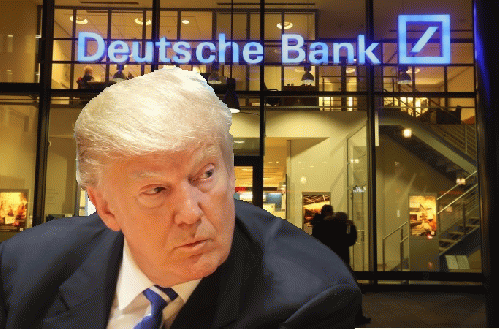His looming impeachment is arguably the least of Donald Trump's problems.
Once he's out of the White House, he must contend with a fraudulent financial situation that could land him in prison.
On Tuesday, the New York-based U.S. Court of Appeals for the Second Circuit ruled Deutsche Bank and Capital One have one week to begin turning over Trump's financial information.
The court's 106-page ruling states:
"[The House Intelligence and House Financial Services Committees'] interests in pursuing their constitutional legislative function is a far more significant public interest than whatever public interest inheres in avoiding the risk of a chief executive's distraction arising from disclosure of documents reflecting his private financial transactions."
In April, the House Intelligence and House Financial Services Committees subpoenaed Deutsche Bank for Donald Jr., Ivanka, and Eric Trump's financial documents as part of their investigation into Russian money laundering and potential foreign influence involving the president.
This is the third time a federal appeals court upheld subpoenas for Trump's financial records.
ProPublica reported documents revealing Trump may be committing bank and tax fraud by inflating property values on loan applications, claiming lower values on his taxes.
According to ProPublica:
"Donald Trump's business reported conflicting information about a key metric to New York City property tax officials and a lender who arranged financing for his signature building, Trump Tower in Manhattan.
"More than a dozen tax and finance experts, presented with ProPublica's earlier findings, also said they could not decipher a reason for the differences. As with Trump Tower, the discrepancies made the two properties--a skyscraper located at 40 Wall Street and the Trump International Hotel and Tower near Columbus Circle--appear more profitable to the lender and less so to property tax officials.
"Those discrepancies were 'versions of fraud,' according to Nancy Wallace, a professor of finance and real estate at the Haas School of Business at the University of California-Berkeley. The penalties for false filings can include fines or criminal charges."
According to a prospectus for the bank loan, as of December 2011, Trump's business claimed 99% of Trump Tower's commercial space was occupied; in June 2012, it claimed 98.7%.
Tax filings in January 2012, though, state the building's occupancy was 83%. They were apparently the same the next year.
That year is significant because it was then Trump refinanced his share of Trump Tower for $100 million.
(Note: You can view every article as one long page if you sign up as an Advocate Member, or higher).






